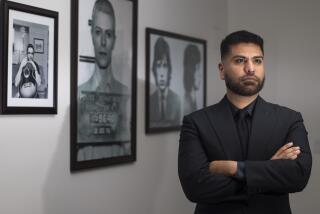A hard fall for lawyer who struggled to escape gang life
On an unseasonably warm day in May 1997, Isaac Guillen marched in a stream of graduates to collect a diploma marking a new stage in his life: Juris Doctor.
Beneath his gown were tattoos of barbed wire, reminding him of his violent younger days and the years he spent in juvenile lockup.
This was the first time many of his friends and family had set foot on a college campus. Surrounded by a pearls and cashmere crowd, they cheered loudly for the triumph of one of their own.
On stage at the UCLA commencement, a graduate crooned a Beatles tune:
I know I’ll never lose affection
For people and things that went before
I know I’ll often stop and think about them
Guillen, then 36, had struggled to escape a difficult past. As he received the purple velvet hood that signifies a law school graduate, he seemed bound for a very different future.
::
In the 1970s, Riverside’s Casa Blanca barrio, not quite a square mile, was ablaze with violence between gangsters and the police.
Guillen, one of five children raised by a single mother, joined the gang life before puberty, according to a picture of his life that emerges from court testimony and interviews with friends, former colleagues and other sources.
At 11, he was initiated into the Devil Wolves and soon racked up arrests for burglary, assault and car theft. He was in and out of the California Youth Authority. His longest stint was on charges of assault with a deadly weapon involving a baseball bat and a knife.
In his early 20s, he was married with children and still living the street life when his apartment was shot up by a rival gang. Dodging the gunfire with his toddlers, he made a decision, he later told a colleague.
He entered alcohol rehab and quit drinking. He began classes at community college, then transferred to UC Berkeley. He and his wife divorced, and he began caring for two sons and a daughter.
At Berkeley, where he carried a blue Jansport backpack nearly bursting with books, he excelled and was admitted to an honors seminar.
He took classes with sociology professor Martin Sanchez-Jankowski, a renowned gang scholar. When he visited the professor during office hours, Guillen’s eyes would light up discussing theories about urban poverty and gang life.
“He was excited about ideas,” Sanchez-Jankowski recalled. “He wasn’t a one-dimensional person. He was smarter than that.”
In 1994, Guillen graduated with high honors and went on to the UCLA School of Law.
There, he applied for an internship at the Los Angeles County district attorney’s office. But with his lengthy rap sheet, he was turned down.
Next, he headed to the federal public defender’s office, where attorneys took a chance and gave him a position as a law clerk. He met Ellen Barry, a deputy federal public defender, who thought: This man is a living embodiment of the credo defense attorneys live by — people are more than their worst mistakes.
Guillen asked to work on Barry’s current case, involving a 1995 indictment of Mexican Mafia members. She represented Alex “Pee Wee” Aguirre, who was accused in the murders of four fellow gang members.
Guillen knew something about the Mexican Mafia — his Berkeley honors thesis was on Latino prison gangs. He also knew the streets. Barry took him along when she visited the murder scene and interviewed witnesses. She relied on him to tell her when they weren’t welcome in a particular place.
Working on the case, Guillen got to know Aguirre, who put out a query among California Youth Authority alums and on the streets of Riverside, asking for information about the young lawyer.
Word came back: Guillen’s street credentials were real, and he wasn’t an undercover cop.
::
When Guillen finished law school, defendants in the Mexican Mafia case signed a hand-drawn card congratulating him, Barry recalled.
Barry and other attorneys wrote to the state bar urging that Guillen be admitted despite his criminal record. In 1998, after passing the bar exam, he became an attorney.
He set up shop in a tiny office in El Monte. The connections he made on the Mexican Mafia case proved valuable. In the jails, he became known as the attorney from the streets, who would take time to talk to clients.
A few years into his practice, some clients urged him to see a man known as “Puppet” about possible work.
Francisco Martinez was a Mexican Mafia member serving multiple life sentences for racketeering. From behind bars, he oversaw a lucrative crack cocaine operation run by an 18th Street gang clique near MacArthur Park, according to federal authorities.
Martinez had risen to power through the 18th Street gang and still controlled the clique, known as the Columbia Lil Cycos.
Guillen had been handling the appeal of Alberto “Nefty” Pina, a soldier in the Lil Cycos, in a racketeering case.
When they met in 2003 at a federal lockup in downtown Los Angeles, Martinez asked a favor. He wanted Guillen to pass messages to Pina:
“How’re you doing.”
“Everything OK.”
“He sends his regards.”
Guillen had an inkling there was more to the messages, but he wasn’t being asked to smuggle drugs or take part in a beating or murder. He agreed.
When Pina’s sister delivered the payment for Pina’s appeal, she also handed him an additional $15,000. The money, she said, was Martinez’s, to be managed on his behalf.
Guillen locked it in a safe in his office.
::
In the summer of 2004, a federal judge in Riverside, presiding over a drug-dealing case against one of Guillen’s clients, summoned the lawyer to court.
The judge told him the Mexican Mafia had ordered him killed — and Guillen’s client, a member of the Black Angels, was supposed to carry out the hit. It is unclear where the information came from; the relevant records are under seal.
In closed-door court proceedings, the judge removed Guillen from the case because the threat put him in a conflict of interest.
Guillen asked Martinez what was going on. Martinez assured him he would take care of it.
Guillen never found out if there really was a contract on his life or why.
“He’d use it at times,” Guillen later said in court. “‘I saved your life.’ I felt like I owed him something.”
About that time, Martinez told Guillen to use the money he had given him to make monthly deposits of $500 to his prison account. He also asked Guillen to look into one of his investments.
“Shaggie,” a shot-caller for the Columbia Lil Cycos, had invested $170,000 of Martinez’s money in a brothel in Guadalajara.
Martinez asked Guillen to fly to Mexico to “kick the tires.”
Guillen reported back that the building looked shoddy, and the receipts for construction work appeared to be forged.
After that, money from the gang’s drug dealing and other activities went directly to Guillen. In return, he received a cut of $3,000 a week.
::
Guillen, who had married a probation officer he met at East Los Angeles College, bought a $1-million, five-bedroom home in San Dimas, dove gray with white trim. His law office was now in a modern West Covina office building, with a lunchroom and a library.
Every year, he would go to Barry’s Christmas parties, but he never touched the alcoholic punch.
Through a friend of Guillen who knew someone in TV production, Hollywood executives learned of his life story. In 2006, Jennifer Lopez’s production company announced plans for a TV drama based on Guillen’s life. The show, “Brethren,” would chronicle a gangbanger turned defense attorney who lives under constant suspicion that he could be corrupted.
“What interested me was the fine line the character must constantly walk,” Lopez said in the press release.
But Guillen, now part of Martinez’s trusted circle, was veering far from the line.
At a maximum-security prison in Colorado, the two discussed gang business in code. On the letterhead of his law office, Guillen wrote messages to Martinez updating him on gang affairs. “High court judges” meant the Mexican Mafia. A “lower court judge” was a shot-caller.
Guillen slipped drug ledgers inside legal papers for Martinez to review.
At a Denny’s parking lot off the 10 Freeway, Guillen would receive wads of cash from 18th Street gangsters — as much as $17,000. He delivered some of the money to Martinez’s family in Mexico, crossing the border with $50,000 tucked around his waist.
::
Guillen soon learned that laundering drug profits wasn’t so easy.
Businesses he started with Martinez’s money — a limousine shop, a real estate company and a tequila distillery — all went under. At the same time, the gang was having problems. In 2007, gang members targeting a defiant street vendor shot and killed a newborn baby in Westlake, leading to a police crackdown. Key members of the clique were arrested and drug proceeds plummeted.
Guillen knew Martinez’s patience was wearing thin.
In 2008, a Mexican Mafia member who was about to be paroled went to a prison investigator with letters he had received from Martinez.
In the letters, Martinez angrily recounted the failed businesses and described what he wanted done to “Huero,” or white boy, his nickname for Guillen.
“P.S. At the end of all this I want Huero taken out when he goes to TJ, just to set an example.”
::
Earlier this year, Guillen appeared in a federal courtroom in Los Angeles.
There was no suit this time and no briefcase. He wore light gray sweats and laceless Reeboks. Shackles clinked with each step.
Guillen was arrested in 2009 in a continuing crackdown on the Columbia Lil Cycos, and has been held without bail ever since. After his arrest, authorities showed him Martinez’s letter.
Guillen agreed to cooperate with prosecutors and pleaded guilty to racketeering and multiple counts of money laundering. He is scheduled to be sentenced in July.
During two days of testimony in March, Guillen matter-of-factly detailed his work for the gang. In all, he said, he had laundered about $1.3 million and been paid about $180,000.
If he felt remorse or fear, he didn’t show it. In exchange for his cooperation, he testified, the government paid $9,000 to relocate his family.
He knows what the Mexican Mafia does to turncoats, if it finds them.
“Strictly death,” he testified under questioning from Assistant U.S. Atty. Kevin Lally. “They’ll kill you.”
Barry, his onetime mentor, sat in the gallery on the first day of his testimony.
As he was led from the courtroom, Guillen paused and looked to the woman who had once believed in him.
Then he turned his head, kept his chin up and continued walking.
More to Read
Sign up for Essential California
The most important California stories and recommendations in your inbox every morning.
You may occasionally receive promotional content from the Los Angeles Times.











